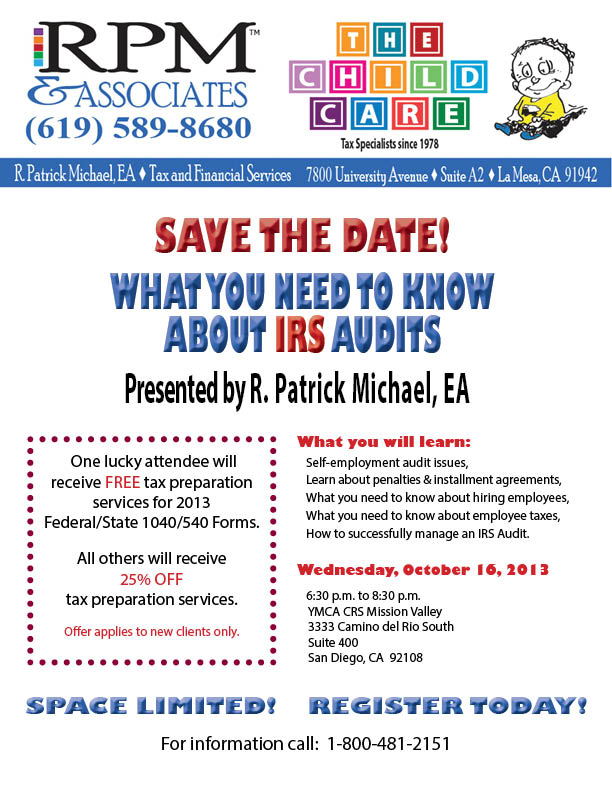DOWNLOAD PDF OF FLYER HERE


Why? Because providers “may be tempted to gain a tax benefit without following the proper rules”.¹ Rules? What Rules? Continue reading
Back on May 28, we wrote that the Court ruled the $150 Fire Prevention Fee assessed by the California State Board of Equalization (BOE) against each structure in a “state responsibility area” is no longer deductible as a tax under IRC §164. Continue reading
Back on June 3 we let you know about the Head of Household (HOH) questionnaires going out to approximately 100,000 California residents. Continue reading
The California offset program has been expanded to allow reciprocal agreements for California to collect debts from out-of-state residents. The Delinquent Taxpayer Accountability Act added Revenue and Taxation Code Section 19377.5, granting the Franchise Tax Board (FTB) the authority to enter into reciprocal agreements with other states to offset refunds to pay personal income tax (PIT) debts owed to the partner state. Continue reading
Actually, the IRS does not look specifically at any one factor, but one factor can be enough to cause the IRS to take a closer look. They may determine that a worker is an employee and not a contractor. What does that mean for you? That means if they determine that your contractor was an employee – you could face unexpected payroll taxes and penalties. That’s why we’re giving you tools to make sure you know the difference, and that you are taking care of business. Continue reading
A recent article in the Franchise Tax Board of California newsletter centered around a scam that affected hundreds of San Diego senior citizens that were bilked out of almost $2M. Continue reading
The Franchise Tax Board of California has provided their report of the Federal Income Tax Changes Summary for 2012. 60 pages of changes. The FTB 2012 summary explains new federal laws, along with the effective dates, and the corresponding California law, if any. It includes an explanation of any changes made in response to the new federal law, and the impact on California revenue if California conforms to the federal changes.
In Tom Copeland’s “Taking Care of Business”, he touches on what qualifies as outdoor deductions for child care provider businesses. Bottom line? Deduct all the expenses that are designated as “ordinary and necessary” to your business, especially if it is used 100% for your business. But what about those expenses that are used for business and personal purposes? They may be deductible, in part, so download our Time-Space Percentage Crib Sheet so you can keep track of those receipts! Download Crib Sheet here.
School is done and you are ready to start mapping your career. Here are a few tips for you and your parents, to keep your taxes low. Continue reading
If you expect a jump in your income, we need to talk. Have you sold stock or property? Getting a big bonus (larger than in the past)? Had an unexpected windfall? I’ve used the word “jump” because if your income is usually high, we both know the numbers, and I make a point of keeping you up on the numbers. If, on the other hand, your numbers suddenly increase (larger than I normally see) then please let me know. Continue reading
Beginning January 1, 2014, taxpayers who complete a like-kind exchange of California property for property located out-of-state will be required to file an information return with the FTB. (New R&TC §§18032, 24953 added by AB 92)
The information return must be filed for the year in which the exchange is completed and each subsequent year that the gain or loss is deferred. If the taxpayer fails to file an information return, and a required tax return is not filed, the FTB may estimate net income and assess tax, interest, and penalties.
For the full text of the bill, go to:
http://leginfo.ca.gov/pub/13-14/bill/asm/ab_0051-0100/ab_92_bill_20130614_enrolled.pdf
One of the advantages of operating your own business is hiring family members. However, the employment tax requirements for family employees may vary from those that apply to other employees. Below, we point out some issues to consider when operating a husband and wife business. Continue reading
For most taxpayers, the tax deadline has passed. But planning for next year can start now. The IRS reminds taxpayers that being organized and planning ahead can save time and money in 2014. Here are six things you can do now to make next April 15 easier. Continue reading
Just because you believe you are unable to recover a debt, you must be absolutely certain there is no prospect of recovery. And even then, the loss may be disallowed. The courts will look at the level of collection effort that was made by the creditor, and if there is even a remote possibility that the debt can be collected on.
Many of you maintain good records tracking your hours when children are present, but how good are you tracking your hours – when children aren’t present? There are chores/tasks you perform, maybe on a daily basis, after or before the children arrive. Those hours are important. They add up. It only applies to chores/tasks performed on location. You can’t count the hours spent doing general housekeeping. One good way to determine what you should count is to ask yourself – “would I be doing this, if I weren’t in business?” If the answer is “no” … then count it. Don’t count washing your cars, mowing the lawn, cleaning the oven, etc.
To download a copy of our Daily Chore/Task Checklist, please visit http://childcaretaxspecialists.com/blog/
A newsletter article by Kathryn Zdan, EA, and Managing Editor at Spidell’s, states that Boomers are retiring earlier than anticipated, but that there is a top concern about long-term care costs. Her summary is based in a survey released by the Metlife Mature Market Institute providing some interesting statistics related to how the oldest group of Baby Boomers (those born in 1946) is handling retirement.